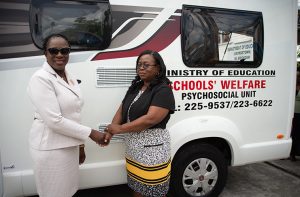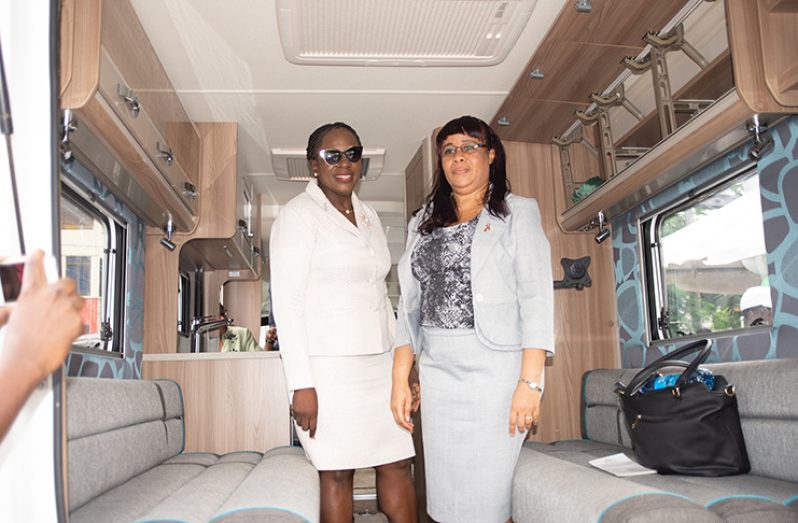– to help traumatised kids adopt coping mechanisms
BY the end of November, a number of children will begin benefitting from the country’s first ever mobile psychosocial unit to be launched by the Ministry of Education.
The project, which costs some $16.3M and is designed to cater for children’s psychological and social counselling needs, will be targetting from nursery to secondary-school-age children in Regions Three (Essequibo Islands-West Demerara), Four (Demerara-Mahaica) and Ten (Upper Demerara-Berbice).
It will be managed by the ministry’s Schools Welfare Unit through an initial workforce of 10 counsellors, with the aid of such other ministries as the Ministry of Public Health and Ministry of Social Protection for the provision of specialists.
The Unit was commissioned on Monday at the Department of Education by Minister of Education, Ms Nicolette Henry, with the assistance of Chief Schools Welfare Officer, Ms Glenna Vyphius.
Its main focus will be to increase the learners’ ability to exercise control and reduce their stress levels; to enhance learners’ resilience; to enable them to use the most effective coping skills to offer a quick response to trauma; and to maximise support available from family and friends.
In her address, Minister Henry explained that the main purpose of the unit is to enable children to receive age-appropriate psychosocial services, and to narrow the gap that exists in the education system where psychosocial support is concerned.
“This unit, Minister Henry said, “is an important part of what we’re required to do in the education sector, particularly given that in the public education system is where most of our vulnerable and disadvantaged children are attending school.
“So it is important that we provide them with the type of support that is needed in order to understand their vulnerability, and to provide the services in collaboration with other stakeholders.”
JUST THE BEGINNING
Although beginning with just one unit, which will initially address the concerns of Region Four, the ministry hopes to eventually acquire additional ones to cater for the needs of the wider population.

As the counsellors prepare to meet with children where they are, Minister Henry is urging the designated personnel to demonstrate the highest of professionalism in conducting their responsibilities.
“Our schoolchildren, our learners have a right to be heard in matters that affect their life experience in terms of education.
“Many times we have our students with a lot of needs that are unmet; a lot of issues that are not addressed because we do not have either the capacity or the resources to undertake those,” Minister Henry said, adding:
“It is my expectation that my staff will exercise the level of professionalism that is required to ensure that the mandate is met, and that our children, even though we’re starting out very small, will begin to have access to these services.”
The minister stated, too, that where there is need for continued services, children will be referred to the specialists, even though teachers will be working along with the Welfare Unit to identify special cases in the classrooms.
Ms Vyphius said that working along with welfare officers stationed in the various regions, areas most in need would be identified.
She thanked the minister for her vision for the nation’s children, even as she, too, encouraged those involved to give of their best to ensure that the initiative is a success.
MORE ACCESSIBLE
“This mobile unit will no doubt make counselling more accessible to many schools and communities to bring about positive behavioural changes, and ultimately a better home, a better school, a better community and, by extension, a better life,” she said.
Remarks came, too, from Deputy Chief Education Officer, Ms Ingrid Trotman, who stressed that the much-needed services of the Mobile Unit will help to positively influence school attendance and achievement.
“Learners are exposed to violence, separation, loss, disaster and trauma, and oftentimes they need support to be able to manage and cope with their feelings,” she said, adding:
“The Mobile Psychosocial Welfare Unit will ensure adequate access to psychosocial services and provide the needed for support for learners to overcome such difficult and challenging experiences.
“I believe that if the well-being of learners is taken care of this will improve the level of attendance in our schools and, as you may be aware, the attendance and punctuality of learners is of major concern to us.”




.png)









